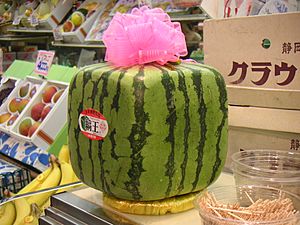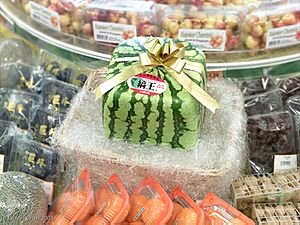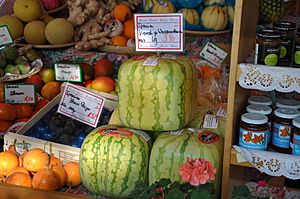Square watermelon facts for kids
Square watermelons are special watermelons grown to be shaped like a cube instead of their usual round shape. You can often find these unique watermelons for sale in Japan. They are mostly bought for decoration, not usually for eating, and can be very expensive. Sometimes, they cost as much as US$200!
Contents
Why Are Watermelons Grown in a Square Shape?
Square watermelons were first created to solve a problem: regular round watermelons can take up a lot of space in a fridge and roll around when you try to cut them. The idea was that a cube shape would fit better and be easier to slice without rolling away.
A graphic designer named Tomoyuki Ono came up with this clever idea in 1978. He showed his first square watermelons in an art gallery in Ginza, Tokyo. He even got a patent for his invention in the United States.
How Are Square Watermelons Made?
To make a watermelon grow into a cube, farmers place the young fruit inside a clear, square box. As the watermelon grows bigger, it fills the box and takes on its shape. This process makes the watermelon look very neat and unusual.
These special watermelons often appeal to people who are wealthy or enjoy unique, fashionable items. In 2001, a square watermelon in Japan could cost about ¥10,000, which was around US$83 at the time. This was two or three times more expensive than a regular watermelon! By 2014, some were selling for $200 in the United States.
Are Square Watermelons Good to Eat?
Even though square watermelons were first designed to be practical, their high cost makes them less useful for everyday eating. Also, to make sure they keep their perfect cube shape, these watermelons often have to be picked before they are fully ripe. This means they might not taste as sweet or be as good to eat as a regular, ripe watermelon.
Other Fun Watermelon Shapes
Since the idea of the cube watermelon became popular, farmers have started growing watermelons in other fun shapes too, like hearts and pyramids! You can now find these uniquely shaped watermelons in other countries, not just Japan, such as in Germany.
 | Janet Taylor Pickett |
 | Synthia Saint James |
 | Howardena Pindell |
 | Faith Ringgold |




